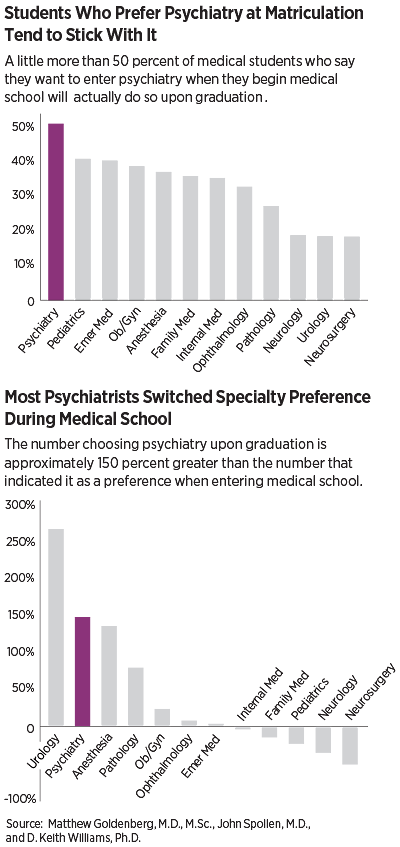Research Reveals Profile of Students Inclined Toward Choosing Psychiatry
Abstract
Most people who choose psychiatry make that decision sometime during medical school. Among those students, the quality of the clerkship experience is paramount.
Fifty percent of students who enter medical school determined to be a psychiatrist stick with that choice through graduation and enter training in psychiatry.
That’s a rate of stability of preference over time that is higher than exists for any other field of medicine, and it tells educators something interesting about the characteristics of new physicians drawn to psychiatry.
At the same time, people who end up in psychiatry are highly likely to have chosen the profession during medical school after initially preferring a different specialty. For those students, the most important factor in their decision to be a psychiatrist is the quality of the psychiatry clerkship rotation.

Other factors associated with choosing psychiatry are valuing work-life balance in their career and majoring in psychology as an undergraduate.
Psychiatric medical education researchers Matt Goldenberg, M.D., and John Spollen, M.D., say these and other factors that emerged from studying the background and specialty preferences of students in medical school offer clues about how to increase the number of new physicians entering the profession.
They say there is a uniqueness to the field of psychiatry—the reason that people who are drawn to it from the beginning is probably because of aspects that are exclusive to psychiatry, so they stick with their choice.
“Psychiatry is unique enough that people who come into medical school focused on psychiatry are unlikely to find anything else that is as good a fit,” Spollen told Psychiatric News. “One type of surgery isn’t a great deal different from another type of surgery, but there’s nothing quite like psychiatry if that’s what you want to do.”
Goldenberg said one intervention to increase psychiatry’s numbers is to influence admissions committees to recruit undergraduate students who indicate an interest in psychiatry. Additionally, the field could take steps to introduce psychiatry—what it is and how it is different from other fields of medicine—into undergraduate curricula.
Nonetheless, most people who choose to enter the field do so during medical school, so the quality of the medical school experience in psychiatry is vital. In fact, of all medical specialties, psychiatry is second only to urology in the percentage of students who switch their specialty preference from matriculation to graduation from medical school.
Goldenberg said among the factors that influence the decision to choose psychiatry among those who are undecided or prefer something else when they enter medical school, the most important is whether they report having an excellent clerkship experience.
Key Points
Research by Matt Goldenberg, M.D., and colleagues reveals a useful profile of medical students who choose to enter psychiatry.
Students entering medical school who want to be psychiatrists are likely to stick with that choice throughout. These students may benefit from early identification of their interest with mentoring and tailored clinical experiences to nurture their interest.
Attracting college graduates who have an initial interest in psychiatry seems likely to increase recruitment rates.
Most students who become psychiatrists make that decision during medical school. These students may benefit from targeted psychiatry interest groups or other recruitment efforts that highlight work-life balance and non-science aspects of the profession.
The student’s rating of the clerkship is the most significant factor in choosing psychiatry as a specialty upon graduation.
Bottom Line: Applying the information learned through this study can help educators recruit more medical students into psychiatry.
“I think it speaks to the importance overall of the medical school experience in recruiting doctors into psychiatry,” he said in an interview. “We know that four out of five medical school students make their decision to enter psychiatry sometime during medical school, and we know that the clerkship is crucial. If we want to increase our numbers, we need to value the educational experience in medical school and do our best to make the clerkship an excellent experience.”
Goldenberg’s research on factors related to medical student choice of specialty was done as a scholar in the Association of Directors of Medical School Education in Psychiatry’s (ADMSEP) Education Scholars Program. Spollen, who served as a mentor on the project, received support from the APA Division of Education.
Goldenberg, Spollen, and colleagues have presented their work as posters at ADMSEP meetings and during workshops at APA’s Annual Meeting.
“We are very aware that there continues to be a shortage of psychiatrists,” said Brenda Roman, M.D., past president of ADMSEP. “Matt’s research showing that early interest in psychiatry is a strong predictive factor means it’s important for educators to be involved in admissions committees so they can select students interested in our field.
“For me as a psychiatric educator, this research challenges us to think in new ways about the clerkship experience during medical school and expanding on the traditional concept of the rotation through an inpatient unit,” Roman said. “Mentoring is so important in medical school, and strong role models in medical school can go a long way in combatting some of the stigma associated with being a psychiatrist.”
Goldenberg and colleagues used data from the Association of American Medical Colleges surveys of 29,714 students who graduated medical school in 2013 and 2014. They analyzed 29 variables hypothesized to be associated with psychiatry specialty choice. Statistical analysis identified subgroups of students based on the highly associated variables who were more or less likely to choose psychiatry.
They found that a student’s rating of the psychiatry clerkship as excellent was the factor most associated with psychiatry specialty choice. Other highly associated factors include undergraduate psychology major, reporting work-life balance as a strong influence on specialty choice, and reporting educational debt as having no influence on specialty choice. ■



